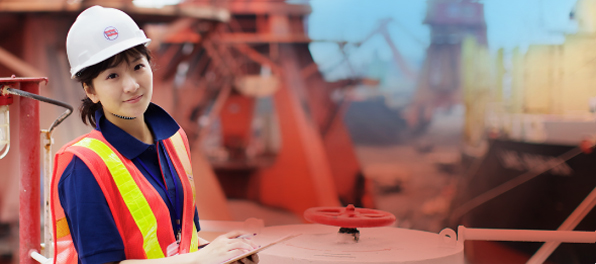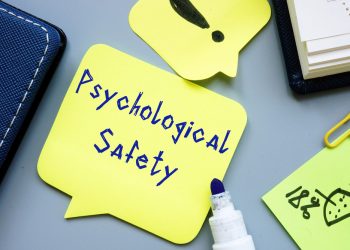Captain Fared Khan, Marine Director, Wallem Group, presents key safety issues from ship managers’ perspective to highlight why a strong safety culture contributes to operational excellence.
The number one priority for me and indeed for Wallem is ensuring our seafarers return safely to their families at the end of every business trip at sea. I strongly believe that the key to achieving this is through promotion of a positive safety culture, reinforced at every level and at every opportunity. At Wallem, we expect high standards of safety and environmental compliance from our seafarers and they in turn can expect commitment from us to provide a working environment that is safe, professional and respectful onboard. This goes a long way towards ensuring high standards of performance, which in turn contributes to delivering positive business results.
Pride and a Safety Mindset
At Wallem, we expect our seafarers to take PRIDE (Personal Responsibility in Delivering Excellence) in their commitment to both the company and our customers. The Future-Ready Wallem Professional seafarer should ideally have the following ten attributes: a safety mindset, the right attitude, be engaged and motivated, have good physical/mental health, business acumen, ownership and pride, the right experience, quality assurance, leadership and management skills and be well trained.
A strong shore team is important – Wallem provides dedicated real time support from the onshore team to ensure safe and successful voyages across the fleet. Ultimately however, seafarers must stand up and take responsibility for both their own safety and that of those around them.
Safety and Responsibility
We continually try to impress is that, no matter whether you are a junior or senior seafarer, when safety is concerned, all voices are equal. As part of our commitment to continuously improve safety onboard, we launched a “Roadmap to Safety and Operational Excellence”. This contained a number of initiatives aimed at helping seafarers take ownership of safety, which is critical when you consider that life onboard is traditionally very hierarchical, with younger seafarers often afraid to speak out. We came up with the “STOP card” to help young seafarers cross this hierarchical gap and be heard. The idea is that any seafarer, no matter the rank, can hold up the card if they feel that something is not safe or not right. Just holding it up is enough. The person receiving the ‘STOP card’ then has to question why it was raised and address whatever issue triggered the card. All our seafarers carry ‘STOP cards’ and they are also found at various locations onboard. The initiative has been very successful and we are seeing a real culture shift, with our seafarers becoming more empowered to use the card and thus taking greater responsibility for crew safety.
Respect and Support
We expect high standards of safety and environmental compliance from our seafarers and in turn, we ensure that all our seafarers have their wellbeing taken care of. Wallem’s ‘Wellness@Sea’ is a holistic program aimed at promoting healthy eating, fitness, a balanced onboard lifestyle and guidance for how to manage stress at sea.
In addition, we feel that is a ship manager’s duty to ensure a respectful and professional workplace environment on board, and that all our seafarers; both male and female, are valued crew members whose well-being is taken care of. This support for wellbeing was formalized in our ‘Dignity@Sea’ program. There is also a designated email address (seavoice@wallem) through which seafarers can raise concerns on any issue without fear of bias or retribution.
I feel that respect and support for seafarers is integral to our strong safety culture and our programs this.
Support for seafarers’ families
A seafarer’s wellbeing also includes the wellbeing of their families. Beyond life on-board, Wallem is keen to ensure that seafarers families back home have the support they need and are well taken care of in their absence. This is very important. It gives our seafarers peace of mind, allowing them to concentrate fully (and most importantly safely) on their job at sea without the stress and distraction of worrying about any problems or situations at home. Wallem depends greatly on the immense support given by “Women of Wallem” (WoW) to the families of our seafarers via their nine chapters which operate in the seafarers’ communities.
Training and development
It is essential that our support to seafarers should extend beyond life at sea to span their entire careers. We promote a lifelong mentoring program starting with our youngest talents. This involves structured capability building to transition our maritime professionals from sea to shore positions. Indeed, many of the leadership team in Wallem started their careers at Wallem as young trainees or junior officers on board.
The engaged seafarer
The ‘people factor’ (or engagement) is something that I really believe in. Having seafarers who feel engaged and positive is essential to boost morale onboard, and ensure that the focus is on operational excellence and safety.
Our legacy should not be measured in injury-free days or incident statistics but in the lives we have touched or changed as we journey towards our goal of excellence, be it colleagues, families, friends or siblings – many of whom are invisibly intertwined in this quest.
Safety for both myself and Wallem is a personal matter. The Wallem crew who take safety and operational excellence seriously, in addition to my colleagues ashore who support this, make me very proud to come to work every day.
By Captain Fared Khan
Marine Director, Wallem Ship Management
The views presented hereabove are only those of the author and not necessarily those of SAFETY4SEA and are for information sharing and discussion purposes only.
[divider]
About Captain Fared Khan
 Captain Fared Khan is a maritime professional with expertise in the fields of HSSE, Marine HR and Learning & Development. Captain Khan began his maritime career at sea, coming up through the ranks to Master on oil tankers followed by onshore roles with American Eagle Tankers (AET) and BP Shipping, where his responsibilities included marine assurance, marine HR, technical management and lay up projects. Captain Khan’s current role as Marine Director at Wallem Ship Management encompasses HSSE, Marine HR and Training to ensure vessels are manned by professional and engaged seafarers who are proud to serve in the Wallem fleet.
Captain Fared Khan is a maritime professional with expertise in the fields of HSSE, Marine HR and Learning & Development. Captain Khan began his maritime career at sea, coming up through the ranks to Master on oil tankers followed by onshore roles with American Eagle Tankers (AET) and BP Shipping, where his responsibilities included marine assurance, marine HR, technical management and lay up projects. Captain Khan’s current role as Marine Director at Wallem Ship Management encompasses HSSE, Marine HR and Training to ensure vessels are manned by professional and engaged seafarers who are proud to serve in the Wallem fleet.

































































